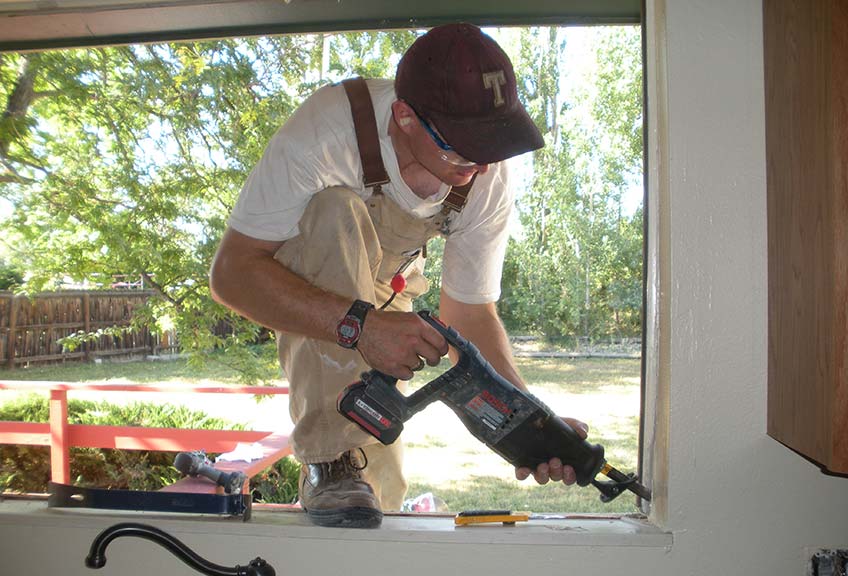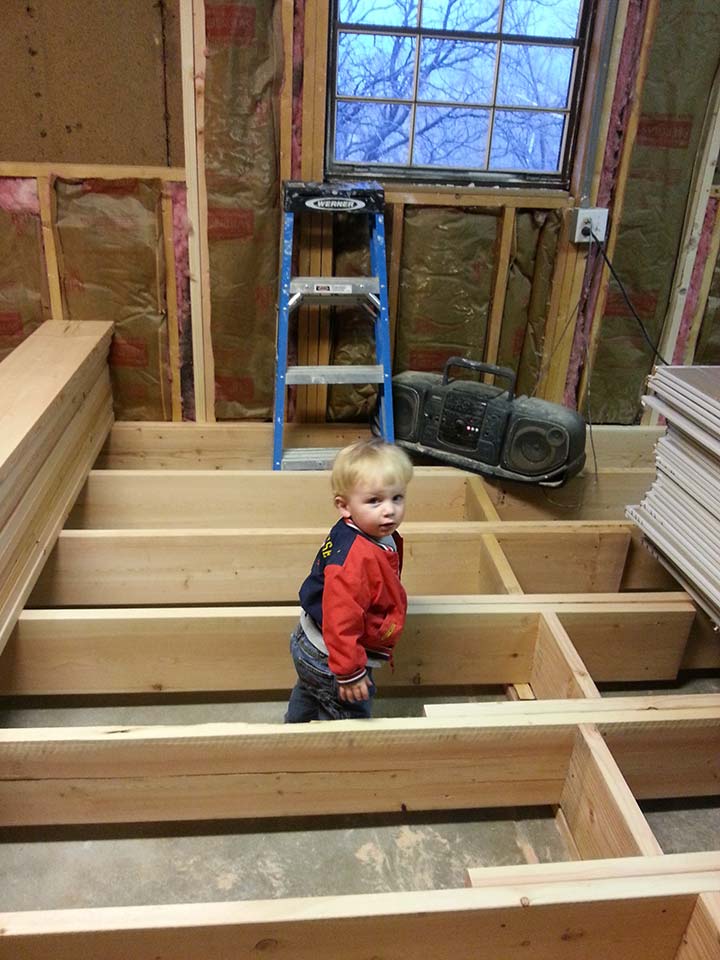Fluid Mechanics and Fortuitous Plumbing: NREL Buildings Researcher Chuck Booten Talks Hands-On Entrepreneurship
By day, National Renewable Energy Laboratory (NREL) Senior Engineer Chuck Booten uses his expertise in fluid mechanics and experimental heat transfer to develop disruptive building technologies like tunable phase-change materials and advanced thermal energy storage strategies for grid flexibility and efficiency. In his off-hours, however, Booten might be wedged under a sink—he and his wife own and manage rental properties, and he can attest that pipes tend to spring leaks.
 Booten installs windows at his rental home. Photo courtesy of Chuck Booten.
Booten installs windows at his rental home. Photo courtesy of Chuck Booten.
In fact, Booten says his darkest time as a landlord came soon after buying a building in Arvada, Colorado. "Pipes leaking to other units, sewer backups, it was terrifying. It helped solidify my deeply held belief that no building should have water in it," he jokes. "Plumbing is the worst thing. Electrical? Totally fine. Plumbing is horrible in every way."
All the sweat equity has had interesting impacts on Booten's work at NREL.
"Making things simpler, or easier, which usually makes them cheaper, is probably the most important thing on the buildings side.”
Booten says his experience as a landlord serves as an "idea pipeline" for his research at NREL. "The biggest benefit is that it gives me ideas I can propose at work. Making things simpler or easier, which usually makes them cheaper, is probably the most important thing on the buildings side." For instance, Booten and Senior Research Engineer Jon Winkler were conducting performance mapping of window air conditioners for the Department of Energy. Referring to loud, bulky window units that allow significant amounts of cool air to escape, Booten says he and Winkler both came to believe "there's got to be a better way to do these." At the time, Booten was also working on a fourplex without air conditioning, and he couldn't find a practical way to install it. Ductless minisplit heat pumps were prohibitively expensive for the building. Wasn't there any middle-ground solution? Booten and Winkler's discussions eventually led to the patented EcoSnap-AC Heat Pump System, a novel air-conditioning system that can be easily and economically installed through a small wall opening. "It solved a practical problem I had right at that time,” Booten says. The pair further developed the concept as part of the first cohort of Energy I-Corps, an NREL-managed entrepreneurial boot camp program. EcoSnap-AC earned an R&D 100 Award in 2017.

In the Booten household, it's all hands on deck for home renovations. Photo courtesy of Chuck Booten.
There are other homeowner conundrums still in need of a solution. One tough nut to crack is the issue of makeup air—two 6-inch-diameter holes in a house are necessary to provide ventilation for combustion appliances like gas furnaces or water heaters, but they also allow a lot of conditioned air to escape. Replacing one atmospherically ventilated appliance does not eliminate the need to provide ventilation for the remaining one. Meanwhile, replacing both at the same time and sealing those holes is too expensive an investment for most owners. A fast-payback solution to this issue would save homeowners a great deal of energy and money.
Booten also toys with the idea of some kind of "cost-effective plumbing breaker." After a supply line broke and continuously flooded a home for a full day, the entire first floor had to be redone while the Bootens put their tenants up for an extended hotel stay. Could there be a way to avoid plumbing disasters like this when no one is home? Booten says, "With electricity, there's always a breaker to stop it. What's the analogy in plumbing? No one's ever done that; I think it's possible."
At the same time that being a landlord inspires research ideas, it helps him lend a more critical eye to new research concepts. When he considers new technologies, he describes a "visceral response to things that are not practical, cost-effective, or do not actually solve a real problem."
"If you want to impact peoples’ lives, you need to understand how they view the world.”
Booten is increasingly able to don his "landlord hat" to understand decision makers' perspectives. Labor is expensive, so products need to be relatively easy to install to gain traction in the market. Will an improvement provide additional amenities that renters will pay more for? Ideally, he looks for projects where "if we can make this work, it would benefit peoples' lives, in a way that they are going to care about. That type of thing really motivates me."
Entrepreneurship for Scientists
Is entrepreneurship something other scientists and engineers should consider? Booten says the answer is a resounding yes. "I'd say it is super important for technical people like engineers and scientists to go out and do something hands-on. If you don't, you are really limiting yourself career-wise. You need to have some kind of practical experience making decisions that other people make, and dealing with problems that other people deal with, so that you are not kind of sequestered in your laboratory and missing out on that. If you want to impact peoples' lives, you need to understand how they view the world."
Booten advises other aspiring scientist-entrepreneurs to take an incremental approach to pursuing a new business, which contrasts with the way scientific researchers generally seek funding for high-risk, low-Technology Readiness Level ideas. He favors grit over risk, citing the anonymous quote: "Most people don't recognize opportunity when it comes, because it's usually dressed in overalls and looks like a lot like work." When it comes to starting a successful business, Booten says, "There's nothing sexy about it, … You're sitting there turning the crank, replacing toilets, stuff that nobody's going to be excited about. But that's how you make money."
Booten will continue leveraging his dual expertise at NREL to make better buildings, happier occupants, and maybe that plumbing breaker.
Read more about Chuck Booten's work and other NREL buildings research at NREL.gov.
Last Updated May 28, 2025
